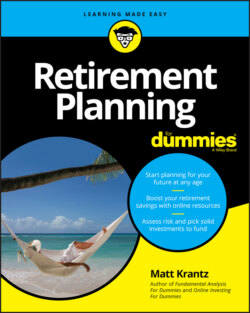Читать книгу Retirement Planning For Dummies - Matthew Krantz - Страница 22
Social Security: The De Facto Safety Net
ОглавлениеI cringe when someone says, “Why do I need to plan for retirement? I have Social Security.”
Yes, Social Security, the nickname for Old-Age, Survivors, and Disability Insurance (OASDI), is designed to prevent you from ending up on the street after working your entire life. But don’t you have higher hopes for your retirement than just scraping by?
Social Security isn’t a savings plan. All the money you pay into the system isn’t in an account with your name on it, like a 401(k) plan. It’s a pay-as-you-go system. In other words, the money you pay in as you’re working is used to pay income to people in retirement now. When you retire, you don’t withdraw the money you paid into the system. Your retirement income will be paid by people in the workforce at that time.
As a general rule, Social Security replaces 40 percent of a retiree's income (www.ssa.gov/planners/retire/r&m6.html). The number is lower for wealthier people who need to keep the gas tank full in their yachts.
Social Security is a fine safety net, but don't bank a comfortable retirement on it. Your retirement-planning strategy needs to be more than just Social Security for three reasons:
Social Security is just one leg of a four-legged stool for retirement income. Social Security was designed not to replace your income in retirement but to reduce the odds that you will starve in your old age. Social Security is intended to be accompanied by a pension, if you have one, retirement accounts, and personal savings.
The funding future of the program is uncertain. The curious structure of the Social Security program — where current workers pay the benefits of current retirees — doesn’t leave much room for error. When you have a big wave of retirees, as you do with Baby Boomers retiring now, the system is strained.Starting in the late 2010s, the cost of Social Security is expected to outstrip its income for the first time since 1982 (
www.ssa.gov/oact/tr/2018/tr2018.pdf). Some of the shortfall can be made up with a small amount of reserves. But until the system is reformed, the reserves are forecast to be depleted in 2034, at which point they could pay 77 percent of scheduled benefits. When you hear the word reform, that likely means either workers will pay more in or retirees will get less out.Meanwhile, the full retirement age to get the entire payout from Social Security has changed from 65 to 66 and now to 67, as follows:Birth YearFull Retirement Age1937 or earlier65193865 and 2 months193965 and 4 months194065 and 6 months194165 and 8 months194265 and 10 months1943-195466195566 and 2 months195666 and 4 months195766 and 6 months195866 and 8 months195966 and 10 months1960 and later67You receive reduced benefits if you retire early. The earliest you can claim retirement benefits is age 62. But if you do that, your benefit is reduced by 30 percent. Even if you retire at 65, which many people think of as retirement age, your benefit is reduced by 13.3 percent. The following lists the benefit reductions when retiring early.Retirement AgeRetirement Benefit Reduction62About 30%6325%6420%6513.3%666.7%
So you can see why Social Security isn’t your ticket to retirement riches. It’s up to you to plan for retirement. Now it’s time to find out how.
